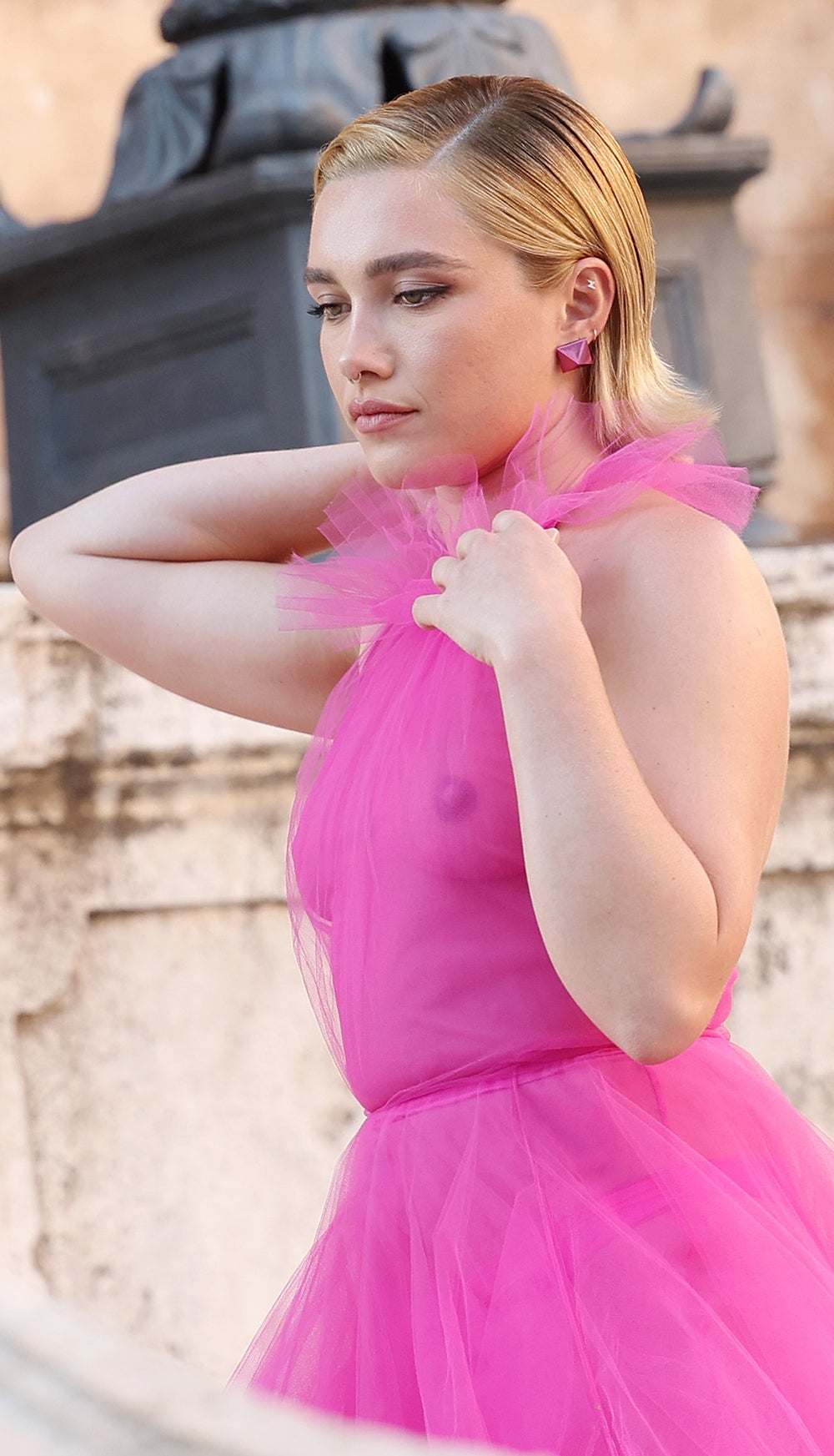The Independent's journalism is supported by our readers. When you purchase through links on our site, we may earn commission.
Florence Pugh’s breasts are not your concern – women can wear whatever they like
As the Oscar-nominated ‘Little Women’ star responds to backlash for wearing a sheer dress, Olivia Petter examines society’s obsession with policing women’s bodies


Your support helps us to tell the story
From reproductive rights to climate change to Big Tech, The Independent is on the ground when the story is developing. Whether it's investigating the financials of Elon Musk's pro-Trump PAC or producing our latest documentary, 'The A Word', which shines a light on the American women fighting for reproductive rights, we know how important it is to parse out the facts from the messaging.
At such a critical moment in US history, we need reporters on the ground. Your donation allows us to keep sending journalists to speak to both sides of the story.
The Independent is trusted by Americans across the entire political spectrum. And unlike many other quality news outlets, we choose not to lock Americans out of our reporting and analysis with paywalls. We believe quality journalism should be available to everyone, paid for by those who can afford it.
Your support makes all the difference.Of all the things to be angry about right now, last on the list is surely a woman’s nipples. The war in Ukraine is ongoing. Reproductive rights are under threat around the world. The British government has descended into something that can only be described as farce. And yet the thing that rankled social media this weekend was Florence Pugh’s tits.
On Friday, the 26-year-old Oscar nominee – of Little Women, Midsommar and Black Widow fame – walked the red carpet at Valentino’s haute couture show in Rome wearing a beautiful gown. The fuchsia halter-neck design, created by the Italian brand’s artistic director Pierpaolo Piccioli, featured a tulle skirt, high neckline and – here’s the rub – a sheer bodice. Pugh looked incredible. But after posting a photograph of herself wearing the dress on Instagram, she was inundated with criticism.
“I would be absolutely mortified that someone I knew dressed like this,” wrote one person. “Wear a dress that leaves something to the imagination,” added another. Other, more vulgar, comments targeted Pugh’s body, with some going so far as to call her “flat-chested” and make references to “her tiny tits”. More than one person labelled the actor a “s***”.
On Sunday, Pugh responded to the opprobrium with a follow-up post explaining that she knew the gown would spark “commentary”. “What’s been interesting to watch and witness is just how easy it is for men to totally destroy a woman’s body, publicly, proudly, for everyone to see,” she wrote. “I’ve lived in my body for a long time. I’m fully aware of my breast size and am not scared of it [...] what’s more concerning is…. Why are you so scared of breasts? Small? Large? Left? Right? Only one? Maybe none? What. Is. So. Terrifying.” These are questions nobody should have to ask, particularly not in 2022.
The fashion industry has long favoured sheer fabrics that flatter and reveal the female form. Consider Yves Saint Laurent’s silk blouses in the 1960s, and the various sheer dresses that followed over time at the likes of Versace and Prada. Just take a look at Kate Moss’s wardrobe in the 1990s. Today, sheer designs are everywhere. The so-called “naked dress” has become one of the go-to trends of the season, with everyone from Rejina Pyo and AMI to Tom Ford and 16Arlington debuting designs featuring see-through bodices. Why, then, is it deemed so unacceptable when someone like Pugh taps into such a trend?
“It’s extraordinary that this is still an issue,” says Rebecca Arnold, senior lecturer in history of dress and textiles at The Courtauld. “Since the revival of the Wonderbra in the early 1990s, breasts have been smoothed and made uniform through padding. Even the outline or suggestion of nipples has become increasingly problematic, though not usually for women themselves.”
The current trend for sheer fabrics, Arnold says, could be an extension of the way many women shunned bras during lockdown, trading restrictive underwired garments for softer alternatives, or no bra at all. But while these looks might be embraced in our living rooms or on runways, it’s a different matter altogether when you take them elsewhere.

“What is possible and even desirable within the fashion world can quickly become problematic when taken out of that realm and into the public,” says Arnold. “When not contextualised within a runway show or a fashion editorial, revealing fashions are judged, and by far less tolerant standards that focus on contemporary morality rather than aesthetics.”
The backlash to Pugh’s dress is an unfortunate symptom of society’s compulsion to police women’s bodies. It manifests in myriad forms, but most often with regards to what we choose to wear. It’s also far from an isolated incident. Take writer and broadcaster Camille Charriere, who was met with a similar response when she stepped out on her wedding day in a see-through lace gown by Harris Reed.
“It’s funny because when I was getting the dress ready, we were very meticulous about making sure no nipple would be visible,” she recalls. Indeed, it wasn’t. But that didn’t stop trolls from inundating Charriere with every sexist insult under the sun – from “hooker” to “whore” – simply because she wore a visible thong underneath the gown.
Writing about the criticism for Harper’s Bazaar, Charriere put the response down to “deeply entrenched, abstract ideas about how women should dress and behave – standards created by a patriarchal society”. Such ideologies aren’t going away any time soon. Charriere tells me she refrained from instagramming a photograph of herself at Couture Week because she was wearing a sheer dress; her nipples were visible. “I just knew I’d get attacked for it and I’m too tired to deal with that this week,” she says.
As with all of these things, though, this degree of misogyny has a disproportionate impact on marginalised women. Occasionally, it’s even facilitated by social media’s restrictive nudity policies – Instagram specifically bans “photos of female nipples”. All this became clear last year when model and activist Nyome Nicholas-Williams uploaded a photograph of herself on Instagram in which she was posing topless with her arms crossed, covering her breasts. Despite the fact that nothing was on show, the image was swiftly taken down. A plus-size black woman, Nicholas-Williams pointed out how many photographs of slim, white women doing similar poses were permitted on the platform.
An online campaign was launched and culminated in Instagram’s CEO Adam Mosseri emailing Nicholas-Williams to apologise and arrange a call. As a result, the platform has now changed its policies to allow images such as the one of Nicholas-Williams to be uploaded without any issues. It was a major step forward, but as the response to Pugh’s image has shown, we still have a long way to go.
“This obsession with women’s bodies has to stop,” says Nicholas-Williams. “We should not be commenting on anyone else’s body. It is 2022 and if a woman’s body does not fit society’s ‘ideals’ then she is automatically ridiculed. As a society, we have a lot of work and unlearning to do. Florence looked absolutely stunning. That is the beginning, middle and end of it.”
The reaction to Pugh’s outfit is a bleak one that highlights the extent of our misogynistic society. But as a celebrated actor with 7.5 million followers on Instagram, Pugh also happens to have a powerful voice. The fact that she has used it to speak out against her critics, highlighting their own ignorance and sexism, is refreshing and invaluable. It shows others that women will no longer put up with being told what they can and cannot wear, or which parts of their bodies they should and should not show. Frankly, we’ve put up with it for far too long.



Join our commenting forum
Join thought-provoking conversations, follow other Independent readers and see their replies
Comments